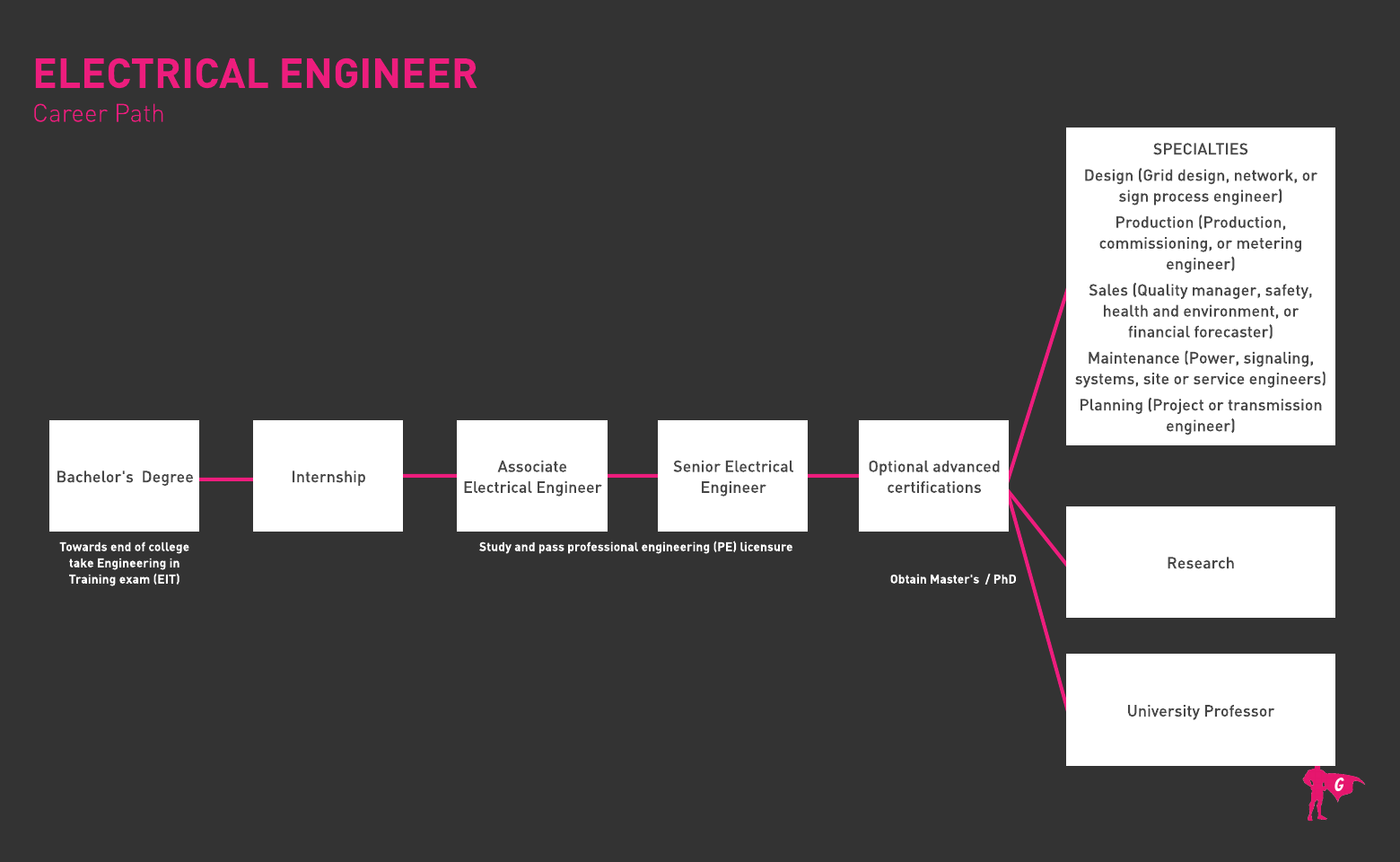聚光灯
Circuits Engineer, Design Engineer, Electrical Controls Engineer, Electrical Design Engineer, Electrical Engineer, Electrical Project Engineer, Instrumentation and Electrical Reliability Engineer (I&E Reliability Engineer), Power Systems Engineer, Project Engineer, Test Engineer
Electrical Engineering is considered one of the “newest” of all engineering fields, though it dates back to the early 19th century! Engineers in this field use physics and math principles related to electricity, electronics, and electromagnetism in order to work on existing equipment and develop new ideas for the future. Our entire modern age of lights, power, television, radio, computers, and mobile devices can be traced back to the efforts of Electrical Engineering pioneers like Tesla, Edison, Westinghouse, Marconi, and Farnsworth.
Indeed, there are few areas in today’s world that aren’t touched by Electrical Engineers somehow. From electric motors to navigation and communications systems, they’re in the thick of things, designing tomorrow’s latest innovations for private industry and governmental agencies. They rely on software to help with designs, work with clients and other engineers on the electrical details of projects, and ensure manufacturing and installation meets compliance standards, as well as the operational needs of their customers. They’re also responsible for testing, maintenance, documentation, customer support, and upgrades in some cases. It’s a busy career field, but who knows where we’d be without their ceaseless efforts to push the boundaries of what’s possible?
- Working with teams to meet objectives
- Designing cutting-edge new products and equipment
- Patenting original (and potentially lucrative) designs
- Helping develop concepts into functioning realities
- Creating technology that can improve people’s lives
- Altering the course of human history through inventions!
Electrical Engineers usually hold full-time jobs working 40 hours a week. Overtime may be necessary when things fall behind schedule or a deadline gets bumped up. Unexpected problems can also lead to pulling more hours. Workers are typically indoors but may need to travel to conduct site visits.
典型职责
- Explore innovative methods to utilize electricity within products
- Design a wide range of systems and products for different end uses, including commercial sales or governmental application
- Craft schematics of systems and maps
- Determine the precise specs for a product’s construction, operation, and installation
- Meet with other engineers to review projects and tasks
- Oversee processes to ensure compliance during all phases of work, from manufacturing and construction to installation, testing, and more
- Use software and computer-assisted technologies
额外责任
- 出现问题时 "随叫随到";分析问题并找到有效的解决方案
- Collaborate with production teams to keep things on-time, on-target (and on-budget)
- 确保遵守州、联邦和国际法规和标准
- Optimize processes, including teamwork
Soft Skills
- 概念化的能力
- Ability to facilitate collaboration between individuals and teams
- 适应性风格
- 强大的人际关系和沟通技巧
- Articulate speaking and clear technical writing
- Listening and reading for detail and deep understanding
- 以合规和安全为导向
- 强烈的安全意识
- 集中精力和注意力
- 客户服务
- 良好的记录管理技能
- 倡议
- 调查性
- 有组织的
- 耐心和分析解决问题的能力
- 现实的
技术技能
- Scientific software:
- Failure mode and effects analysis FMEA software
- Minitab
- Powersim
- MathWorks
- Computer-aided design (CAD) tools:
- Autodesk AutoCAD
- Bentley Microstation
- Dassault Systemes CATIA
- Zuken E3
- C++, JHDL, Perl, Python
- Operating system software, such as Linux, Windows, Shell script, UNIX
- Development environment tools:
- Microsoft VBScript
- LabVIEW
- Verilog
- VHSIC hardware description language
- 工程服务
- 制造业公司
- 军事和政府机构
- Power plants
- Research and development organizations; academic institutions
When it comes to designing products and components that work with electric power, many things can go wrong. Calculations must be precise, testing must be very thorough, and compliance with national and international standards is critical. There’s no margin for error in most projects and the consequences for mistakes can cost lives and ruin businesses. Thus, expectations run high. Electrical Engineers may be “on-the-clock” for a 40-hour week, but free time is frequently dedicated to reading, learning, and keeping up with changes in the field. This commitment is one of the largest sacrifices because Electrical Engineers bear an enormous responsibility to their employers as well as the public, whose health and safety are often linked to the performance of finished products. Of course, workers themselves are also exposed to shock hazards and risk of injury, too.
According to NESCO Resource, “[Electrical] Engineers have their pick of jobs.” Whether that’s entirely true or not, the point is that demand for talent is currently consistent. The Bureau of Labor Statistics predicts it will remain so, at 5% through 2028 (for Electrical Engineers; the average stats for Electrical and Electronics Engineers combined is just 2%).
Specifically, BLS expects growth in “professional, scientific, and technical services firms” as demand for consumer electronics rises. Naturally, such goods are always evolving as technology advances, and it's the Electrical Engineers working hard to facilitate those innovations. In a way, they’re ensuring their own job security! Apart from communications tech, hot markets include solar arrays and semiconductors. Experts are also needed for power grids and continuing automation of processes.
Engineers are realistic dreamers. They love gadgets and tinkering, exploring ways to turn ideas into realities through the application of scientific principles. Many engineers were heavily influenced by the works of early pioneers who paved the way for today’s breakthroughs. They may see themselves, rightfully, as heirs to a long legacy of inventors and visionaries.
Though they may often work in solitude, they often enjoy participating in groups, seeing their roles as serving a larger goal (the Institute of Electrical and Electronics Engineers, for example, has over 423,000 members worldwide). Many people who are drawn to this field were avid science fiction buffs growing up, intrigued by futurist technologies and hardware, and how those things can make life better. They aren’t merely interested in whimsical notions of the future, though. They’re able to focus and figure out how to practically achieve the things they envision, through meticulous planning, research, and testing.
- 70% of Electrical Engineers hold a bachelor's degree; 23% hold a master's. Many university programs feature dual bachelor’s/master’s degree tracks which take ~5 years
- Most major in electrical or electronics engineering, or electrical engineering technology programs that are accredited by ABET
- 教书或从事研发工作通常需要硕士文凭
- 实习、合作项目和其他实际工作经验受到雇主的珍视。
- 开始工作时不需要执照,但在职业生涯的后期可以考虑州执照选项
- 专业工程(PE)执照带来更大的责任范围
- 一个PE必须通过两次考试:
- 工程基础(FE)
- 工程原理与实践(PE)考试
- There are several optional Core and Advanced certifications to consider, including:
- 准系统工程专业人员
- 认证可靠性工程师
- Electronics in Traffic Signal Technician
- Electrostatic Discharge Control (ESD) - Associate Engineer
- Energy Efficiency Management Certificate Program
- IPC-A-600 Acceptability of Printed Circuit Boards
- Key Account Certificate Program
- 住宅电子系统集成商
- 课程应该是ABET认证的,这是以后获得体育执照的一个要求
- Scholarships and STEM pathways! How committed are your potential schools to improving access to help facilitate your entry into their programs?
- 考虑该专业教师的奖项和成就
- Prestigious honors include: teaching awards, IEEE and National Science Foundation awards and recognitions, Fulbright Fellowships, best papers, and distinguished lecturers
- 查看他们的设施(特别是如果你打算亲自参加)。资金充足的项目将拥有最现代、最前沿的研究领域
- 寻找附属的中心和研究所。大多数大型项目都与外部伙伴合作,这可以大大增加你的学习经验。
- 经常看看学校为毕业生提供了什么!学校是否公布了就业统计数据?校友网络是否提供有益的、促进职业发展的指导和网络?
- Free career services, job fairs, and other services are always nice perks, but shouldn’t be a deal-breaker
Check out U.S. News & World Report’s 2020 rankings of Best Electrical Engineering Programs and Best Undergraduate Electrical / Electronic / Communications Engineering Programs. You might also take a peek at Apprenticeship.gov’s list of related opportunities. For lists of certifications, visit O-Net Online and click on the Find Certifications button.
- It pays to get a jump start on college by taking prep classes in high school, such as math and physics. Strong English and technical writing skills will also pay off later
- If offered, consider taking electives in blueprints, computer apps, drafting, and of course electricity and electronics
- 在报名上课之前,尽可能了解职业领域的一切信息。了解自己的专业方向,阅读就业门户网站上发布的职位说明
- 更进一步,列出你梦想工作的组织名单,或许还可以联系在职员工,听听他们的想法
- Get practical experience, tinkering at home, through internships, or apprenticeships
- 不要忽视软技能。工程师也应该是 "人"!
- 志愿为学校委员会服务或帮助开展课外活动,重点是提供领导和管理经验的角色。
- Comb through our below list of Recommended Websites to find professional groups to join. Also become an active participant in your school engineering clubs
- Ask a seasoned Electrical Engineer if they can spare some time to mentor you in exchange for helping them in some capacity

- According to PayScale, a whopping 85% of jobs are found through networking!
- 注册接收招聘门户网站的通知,如Indeed、SimplyHired、Monster、USAJobs、ZipRecruiter、LinkedIn、Velvet Jobs和Glassdoor。
- 让学校为你联系招聘人员。抓住在大公司实习的机会。许多工程师在毕业时都安排好了工作岗位
- Think like the boss. Read NESCO’s “Strategies for Hiring the Best Electrical Engineers”
- Max out your school’s career center offerings. Get resume help, do mock interviews, meet recruiters, and attend job fairs in professional attire with resumes in-hand
- Apply like you mean it. Don’t fire off the same generic application a thousand times. Tailor each to the specific job posting, and do your homework on the company
- Research common interview questions, like those posted on LiveCareer or Glassdoor
- 要向上提升,您必须确定目标,设定里程碑,并制定实现每个里程碑的计划
- 确定自己 5 年、10 年或 20 年后的目标,然后制定计划。你想管理他人和领导团队吗?你想当经理吗?想做销售吗?了解这些目标将有助于您相应地调整自己的教育和培训。
- Your organization will probably invest time and money in you and want to keep you, so make it clear that you’re interested in getting promoted within the company if possible
- Speak with your supervisor or management. Get advice and talk through options. There are endless possibilities within the Electrical Engineering field. Some are more lucrative while others are perhaps more personally rewarding. Ideally you can achieve both!
- Most small- to mid-sized businesses have limited opportunities for advancement, so keep this in mind when applying. To move up any ladder, there must be empty rungs on it!
- Get your PE license as soon as you can and demonstrate your commitment to excellence and your willingness to assume increased responsibilities early
- Knock out additional certs when qualified to do so
网站
- 工程和技术认证委员会
- 关于电路的一切
- 美国工程教育协会
- Electrical 4 U
- Electrical Engineering Portal
- Electronics
- 电子周刊
- IEEE
- 照明工程协会
- 创作指南》(Makezine)
- 麻省理工学院开放课程(MIT OpenCourseWare
- 全国专业工程师协会
- National Society of Professional Engineers (NSPE)
- Occupational Outlook Handbook: Electrical and Electronics Engineers
- 国际汽车工程师学会
- 女工程师协会
- TutorialsPoint
- Virtual Labs
- Wolfram Demonstrations Project
书籍
- Electrical Engineering 101: Everything You Should Have Learned in School...but Probably Didn't, by Darren Ashby
- Electrical Engineering Principles And Application, by HAMBLEY
- Mechatronics: Electronic Control Systems in Mechanical and Electrical Engineering (6th Edition), by W. Bolton
- Practical Electronics for Inventors, Fourth Edition, by Paul Scherz and Simon Monk
- The Beginner's Guide to Engineering: Electrical Engineering, by Mary Ellen Latschar
There are many subfields of Electrical Engineering to specialize in, such as Power, Control, Electronics, Microelectronics, Nanoelectronics, Signal processing, Telecommunications, Instrumentation, and Computers. Electrical Engineering and its associated subfields are a blast for those who are passionate about the work. Yet some people find their thrills in other sectors. Some alternative engineering and non-engineering careers to consider are:
- 航空航天工程师
- 建筑和工程经理
- 生物医学工程师
- 计算机硬件工程师
- 电气和电子工程技术员
- 物流工程师
- 机械工程师
- 网络和计算机系统管理员
- 光子学工程师
- 销售工程师
新闻联播

特色工作

在线课程和工具

年薪预期
New workers start around $104K. Median pay is $136K per year. Highly experienced workers can earn around $171K.





